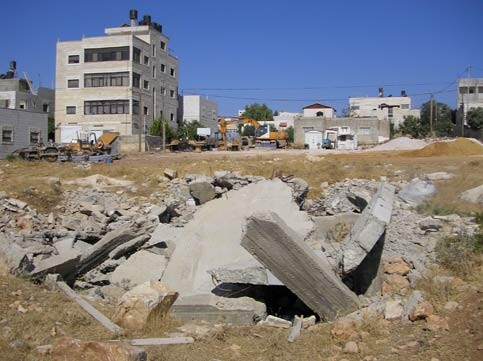IRIN 22 November 2006

A Palestinian home demolished by the Israeli army. (Tom Spender/IRIN)
Palestinian human rights activists have said that using citizens as human shields to protect the homes of suspected militants is wrong, but said Gazans are simply protecting each other and their houses because they believe no one else will.
The comments came after the US-based watchdog Human Rights Watch (HRW) issued a statement on Wednesday condemning Palestinian armed factions for encouraging civilians to gather in and around suspected militants’ homes targeted by the Israeli military.
HRW said calling civilians to a location that has been identified for an attack is at worst human shielding and at best failing to take all feasible precautions to protect civilians from the effects of an attack. Both are violations of international humanitarian law, the group said.
“There is no excuse for calling civilians to the scene of a planned attack,” said Sarah Leah Whitson, Middle East director at HRW. “Whether or not the home is a legitimate military target, knowingly asking civilians to stand in harm’s way is unlawful.”
Jaber Oshaah of the Palestinian Centre for Human Rights in Gaza told IRIN that he agreed with HRW’s statement but could understand why this strategy was being used.
“Using people as human shields is not good and we denounce it. It is not good for the people of any side and they should not be used in that way, no matter what pressure they are under,” Oshaah said.
“But the Gazans are also doing this to protect their own homes because when Israel fires at a house here they often damage or destroy others nearby,” added Oshaah. “So the people are standing together to support each other because they do not believe the rest of the world will do anything for them. But it is a negative way of doing it.”
Israel frequently launches air and artillery strikes on the houses of militants, sometimes telephoning the house minutes beforehand to warn those inside to get out.
According to the Israeli human rights organisation B’tselem, between July and 15 November this year, the IDF destroyed 251 homes in Gaza, leaving 1,577 people homeless.
In 105 of these cases the IDF destroyed homes by air strike after warning the inhabitants to leave. While the IDF generally claims that militants used those homes to store weapons, they have not presented any concrete evidence in individual cases, HRW said.
On 18 November, a new tactic emerged to prevent Israel destroying homes. Mohammedweil Baroud, a commander of the Popular Resistance Committees, reportedly summoned neighbours and friends to protect his house. Soon a crowd of hundreds of Palestinians gathered in, around, and on the roof of the house.
Television pictures showed the roof of the house crowded with people and journalists and illuminated with bright lights.
It was the first time a Palestinian had taken such a step. The Israeli Defence Force (IDF) said that they called off the attack after they saw the large number of civilians around the house.
HRW said that Israel made the right decision not to fire on the Baroud home. “While civilians placing themselves in the way of military actions take on heightened risks, they cannot be considered legitimate targets by the opposing force, and parties to the conflict should cancel or suspend attacks where excessive civilian damage is anticipated,” the rights group said.
Faction leaders in Gaza have hailed Palestinians’ move to guard homes. “It is necessary for our citizens to support those Palestinians who are fighting against Israel,” said Dr Nizar Rayan, a Hamas leader in Gaza.
Hamas said in a statement that the tactic was forcing the Israelis to rethink their strategy in Gaza. “This is an important step in the struggle which is making Israel think. The people protecting houses are breaking Israel’s policy,” read the statement.
In a statement on Israel’s Ministry of Foreign Affairs website, Israel said it had to take military action in Gaza because since its withdrawal from the Gaza Strip last summer, Palestinian terrorist organisations had increased their rocket attacks on Israeli communities in the Western Negev, firing more than 1,000 Qassam rockets at Israeli civilians.
The ministry added that Palestinians had stepped up their arms smuggling operations via tunnels in the southern Gaza Strip, bringing in more than 30 tons of high explosives.
This item comes to you via IRIN, a UN humanitarian news and information service, but may not necessarily reflect the views of the United Nations or its agencies. All IRIN material may be reposted or reprinted free-of-charge; refer to the copyright page for conditions of use. IRIN is a project of the UN Office for the Coordination of Humanitarian Affairs.
Related Links